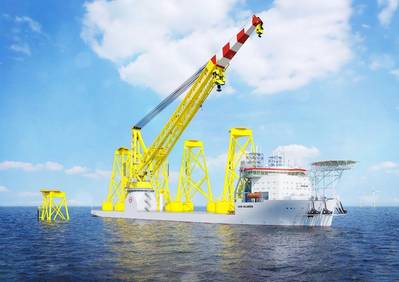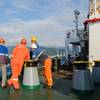Jan De Nul orders Offshore Installation Vessel
Six months after the offshore installation vessel Voltaire, Jan De Nul Group orders Les Alizés, a floating installation crane vessel from the CMHI Haimen shipyard in China.
Together with the Voltaire, this new vessel will be in a super-size class of its own, capable of building the newest generation of offshore wind farms. Les Alizés, that will be ready in 2022, is equipped with a crane having a lifting capacity of 5,000 tons and equally impressive lifting heights.
Les Alizés will be able to load out, transport and install multiple units of the largest and heaviest wind turbine foundations. In addition, as a crane vessel that floats, it will be able to install heavier and larger foundations into deeper waters and in more challenging seabed conditions.
Peter De Pooter, Manager Offshore Renewables at Jan De Nul Group: "The order of the Voltaire was a first step in our strategy to install the newest generation of offshore wind turbines. With Les Alizés we want to further strengthen our vision and our belief in the future of offshore wind energy. We want to be a major and enduring player in this sector. For that reason, we continue to invest in the further expansion of our offshore renewables department."
The vessel will be built at a shipyard of China Merchants Industry Holdings Co. Ltd., located in Haimen, Nantong City, China.
Impressive lifting and loading capacity
Les Alizés is specifically designed for loading, transporting, lifting and installing offshore wind turbine foundations. The main features are a main crane of 5,000 tons, a deck loading capacity of 61,000 tons and a deck space of 9,300 m². With these characteristics, Les Alizés can easily transport the heavier future foundations, several in one trip, to the offshore installation site, with direct benefits in planning, fuel consumption and emissions reduction.
Unlike the Voltaire, Les Alizés does not have four legs to lift itself above the sea surface. It is a crane vessel for floating installation, which means that the vessel is not dependent on the water depths and the seabed conditions. Les Alizés is equipped with a high-performance DP2 system.
Green technology and innovations on board
The latest generation of Jan De Nul's vessels is equipped with an exhaust gas filtering technology that complies with the strict European EURO STAGE V guidelines for emissions on land and inland waterways. So it will be for Les Alizés.
The highly advanced dual exhaust filter system removes up to 99% of nanoparticles from emissions using a diesel particulate filter (DPF) followed by selective catalytic reduction system (SCR) for NOx removal.
As a result of these exhaust filtering systems, Les Alizés and the Voltaire will be the first seaworthy installation vessels in the world with extremely low emissions (Ultra-Low Emission Vessel or ULEv for short) and with EURO STAGE V certification (ULEv notation).
Les Alizés will also have a Cleanship NDO7 label and a Green Passport EU label. The Cleanship label confirms that the vessel checks and minimizes the waste water and all other residual waste. The second Green Passport label means that all materials and hazardous substances are mapped out during the construction phase, in order to facilitate the recycling of the vessel when decommissioning. Both certificates are issued by a specialized external agency.
The name ‘Les Alizés’
The Offshore Installation Crane Vessel is named after the French word ‘alizé’, which means ‘trade wind’.
The reason for choosing this name is because for centuries, trade overseas has been done by means of performant sailing ships. Without engines or any form of propulsion, traders succeeded in sailing the world thanks to their thorough knowledge of nature, the seasons and the regular winds, so-called trade winds. They used the forces of nature as their energy source... renewable in the purest sense of the word.
First for Jan De Nul Group and KBC Bank
On 5 July 2019, Jan De Nul Group concluded an agreement for a green loan with a consortium of five banks, led by KBC Bank, for the financing of both investments. The consortium of five banks consists of KBC Bank, BNP Paribas Fortis, ING Luxembourg, Rabobank and Belfius Bank.
The Voltaire was ordered at the beginning of April 2019 and will be delivered in April 2022. The Voltaire is the third jack-up installation vessel of Jan De Nul Group. Thanks to its main crane with a lifting capacity of more than 3,000 tonnes, this jack-up vessel can help the renewable energy sector to build the new generation of offshore wind farms. The Voltaire can also be used for the offshore oil and gas industry as well as for the decommissioning of offshore installations.
Collective commitment to the climate
The green loan was structured according to the 'Green Loan Principles' as drawn up by the Loan Market Association (the sector association in which banks, lawyers and other financial parties are represented) and with the aim of promoting investments in green projects by providing banks and businesses with guidelines on the characteristics of a green loan.
The market for sustainable financing is experiencing strong growth
However, in the market for sustainable financing, the largest share (84%) is made up of so-called sustainability-related loans, where the terms of the loan depend partly on the borrower's performance in terms of sustainability.
Green loans themselves represent a minority of the total market (16%), as these green loans apply stricter criteria. A green loan should be used in its entirety to finance green projects.















